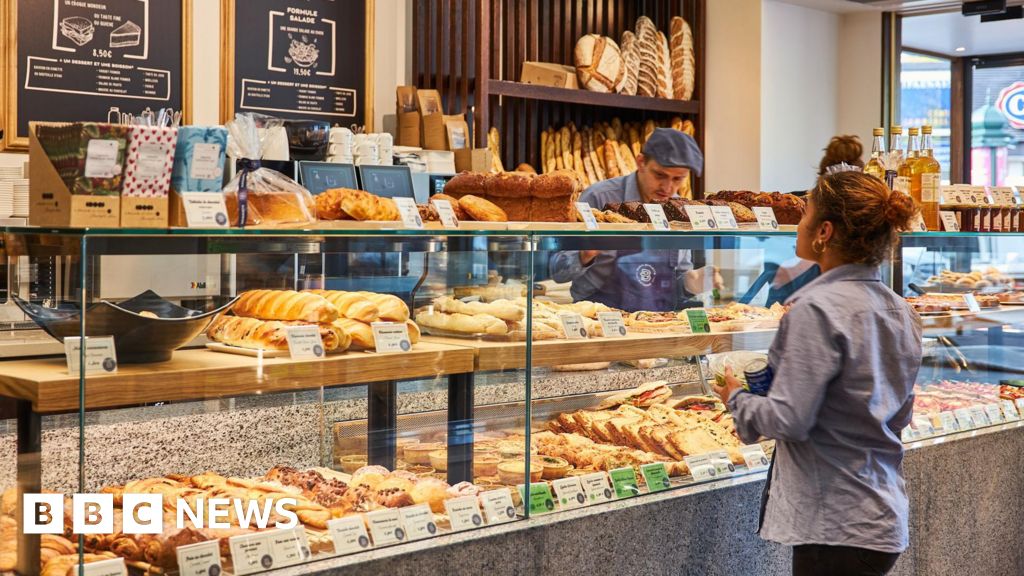ARTICLE AD BOX
Image source, Getty Images
Inflation is at its highest rate for 10 years, having risen to 5.1% in the 12 months to November.
The jump in the cost of living, driven largely by rising fuel and energy costs, puts further pressure on households across the UK.
How will inflation affect me?
Inflation is the rate at which prices are rising. If the price of a bottle of milk is £1 and it rises by 5p, then milk inflation is 5%.
You may not notice price rises from month to month. But right now, prices are rising so quickly that average pay is not keeping up.
It means that the money people earn does not go as far.
In the year to November 2021, regular pay, excluding bonuses and adjusted for inflation, fell 1%.
There are workers in a few sectors - such as lorry drivers - who are in high demand, and whose wages are rising faster than prices.
And in April, the lowest-paid will see the National Living Wage rise by 6.6% to £9.50 an hour - which is higher than the current inflation rate.
But many people are seeing a noticeable drop in their "real" wages.
Image source, Getty Images
Why are prices rising now?
The main reason is the rising global price of energy. This has meant higher energy and transport bills for businesses, many of whom pass on the extra costs to customers.
Supply problems and higher shipping costs also continue to hurt businesses.
Next, the High Street retailer, has admitted its prices could rise by up to 6% this year to keep up with higher costs.
Staff shortages are a particular problem in the UK, due to Brexit and the pandemic, and are prompting some employers to raise wages.
However, this can itself contribute to inflation. Greggs, for instance, has raised the price of some foods in order to cover increased labour costs.
What else could affect the cost of living in 2022?
A number of measures will hit UK households:
How is inflation measured?
Inflation is measured by a body called the Office for National Statistics (ONS) which notes the prices of hundreds of everyday items.
These items are called the "basket of goods", and they're being constantly updated. For instance, in 2021 hand sanitiser and men's loungewear bottoms were added, but sandwiches bought at work were removed.
The ONS releases its measure of inflation each month, showing how much these prices have risen since the same date last year. This is known as the Consumer Prices Index (CPI).
What can be done to tackle inflation?
The Bank of England's traditional response to rising inflation is to raise interest rates.
That means anyone who has borrowed money could see their monthly payments go up, especially on mortgages tied to the Bank of England's rates.
The idea is that when borrowing is more expensive, people will have less money to spend. As a result, they will buy fewer things, and prices will stabilise in response.
But if inflation is caused by external forces, such as the global squeeze on energy prices, then this might not be the answer.
The government might choose instead to cut taxes for consumers on items that are rising quickly - such as VAT on energy bills.
Or, it might target support at those who need it most. It has been reported that it is considering expanding the Warm Homes discount scheme, for example, which offers those in receipt of certain benefits the option to apply for a one-off £140 payment.
How have you adapted to rising prices? Are you shopping or living your life differently as a result? Email haveyoursay@bbc.co.uk.
Please include a contact number if you are willing to speak to a BBC journalist. You can also get in touch in the following ways:
If you are reading this page and can't see the form you will need to visit the mobile version of the BBC website to submit your question or comment or you can email us at HaveYourSay@bbc.co.uk. Please include your name, age and location with any submission.

 3 years ago
56
3 years ago
56








 English (US) ·
English (US) ·